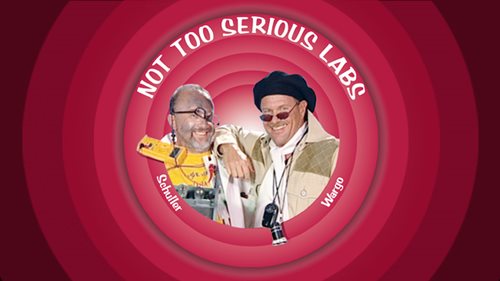
Rich Wargo: “We want to pique the curiosity that drives the study of science. Plus, it’s a fun way to learn.”
What do cute puppies and kittens know about science?
Plenty, if you’re talking about the puppies and kittens in “Smart Puppy and Friends,” a new series of lighter-side learning videos produced by UCSD-TV’s Rich Wargo and UC San Diego physics professor Ivan Schuller.
Aimed at school-age youngsters – plus adults eager to learn science basics – the five 60-second videos blend clever, kid-friendly scripts with the magic of animatronics to simulate “talking” animals, much like the 1995 movie “Babe.”
In this case, the animals are puppies and kittens.
“I want kids to not be scared of science,” said Wargo, UCSD-TV’s science producer. “I want them to feel the same way I feel about it — as fascinating.”

Not Too Serious: Ivan Schuller (left) and Rich Wargo
For example, two of the scientific concepts are magnetism and quantum tunneling.
“I actually didn’t know what caused magnetism until I did this project,” said Wargo, a 20-year producer at UCSD-TV who readily admits he’s not a trained scientist. “We want to pique the curiosity that drives science. Plus, it’s a fun way to learn.”
Wargo voices the kitten, which he describes as similar to Sylvester, the bratty cat created by famed animator Mel Blanc. Wargo’s 17-year-old daughter, Alice, does voiceover for the puppy, who’s more akin to a savvy Lassie.
Currently posted on YouTube, the videos have a certain distinction, says Wargo.
“There are a zillion hits on puppies, but I haven’t seen any other YouTube videos with puppies that talk intelligently about science.”
The series is the latest project produced by Not Too Serious Labs, a spin-off collaboration between Wargo and Schuller. Their previous video productions include When Things Get Small, a 2006 Emmy-winning series aimed at youngsters with an interest in learning about basic science concepts.
The videos were funded by grants from the American Physical Society and the Materials Research Society.
“I believe it’s good to present general science with a warm and fuzzy feeling,” said Schuller. “I’ve always been interested in the many ways we can introduce the principles of science to a wider audience than just scientists.”